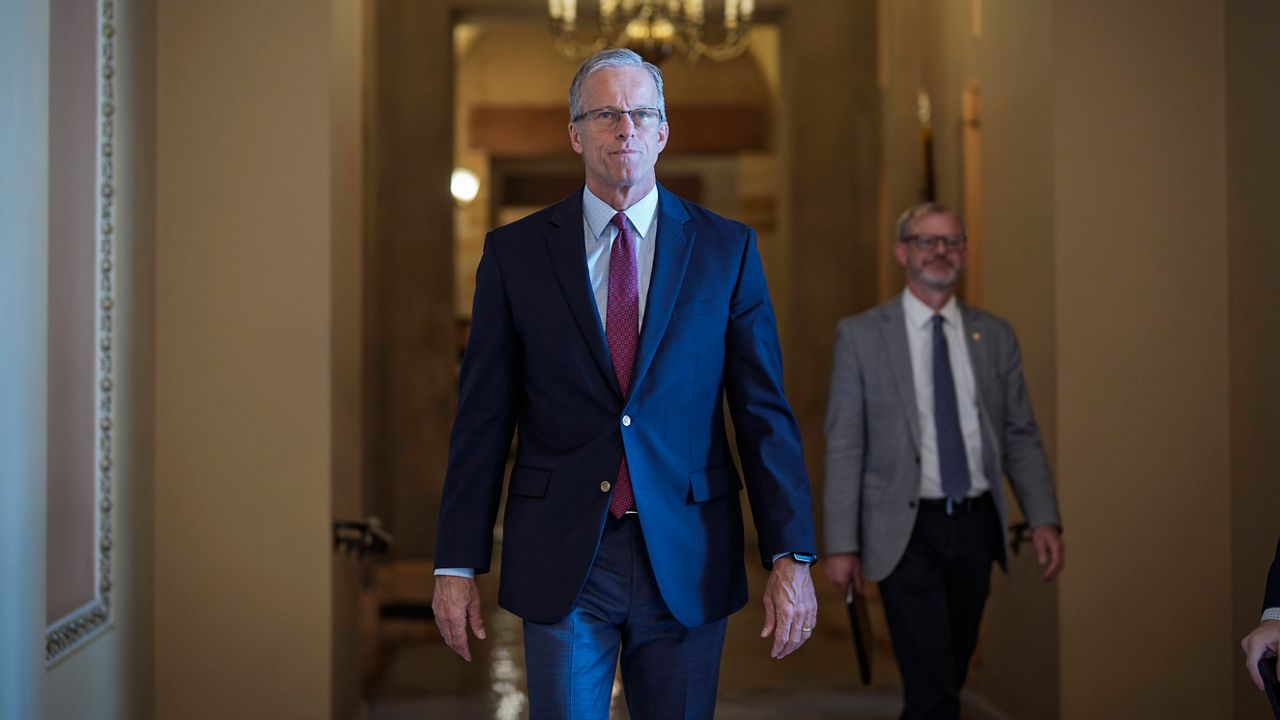WASHINGTON — Fresh off muscling President Donald Trump’s “one big, beautiful bill” over the finish line, Senate Republicans next week are expected to turn much of their attention to passing a package requested by the White House that would formalize some cuts made by the government downsizing campaign led by the U.S. DOGE Service.
What You Need To Know
Senate Republicans next week are expected to turn much of their attention to passing a package requested by the White House that would formalize about $9.4 billion in cuts made by President Donald Trump’s government downsizing campaign led by the U.S. DOGE Service
Senate Majority Leader John Thune, R-S.D., said this week that he intends to bring the package containing about $9.4 billion in cuts identified by DOGE to the floor this month as the chamber is set to break for recess Aug. 1
But Republican senators are staring down a July 18 deadline to pass the legislation in order to adhere to the 45-consecutive-session-days rule that governs the method — known as a rescissions package — which allows Congress to draw back funds it previously approved
Trump on Thursday night ramped up the pressure — and upped the stakes — on the Senate GOP to quickly follow suit, saying those who don’t support it will not get his backing
A few Senate Republicans have made clear they have some reservations about the package
Senate Majority Leader John Thune, R-S.D., said this week that he intends to bring the package containing about $9.4 billion in cuts identified by DOGE to the floor this month as the chamber is set to break for recess Aug. 1.
But Republican senators are staring down a July 18 deadline to pass the legislation in order to adhere to the 45-consecutive-session-days rule that governs the method — known as a rescissions package — which allows Congress to draw back funds it previously approved. The House already passed the rescissions package last month.
Trump on Thursday night ramped up the pressure — and upped the stakes — on the Senate GOP to quickly follow suit. In a post on Truth Social, the president noted it was “very important” that Republicans pass the package and particularly approve the cuts to NPR and PBS while issuing a new threat.
“Any Republican that votes to allow this monstrosity to continue broadcasting will not have my support or Endorsement,” Trump wrote.
The legislation looks to draw back about $9.4 billion in already approved funding in order to make law a portion of spending the DOGE effort said should be cut. This first rescissions package in particular aims to formalize about $8 billion in cuts to State Department funding, particularly for foreign aid, as well as about $1 billion in money for the Corporation for Public Broadcasting, which would scrap dollars set to go to NPR and PBS. Trump has accused both of being biased, something the outlets have fiercely pushed back on, including during a congressional hearing earlier this year that featured testimony from their CEOs.
The Democratic leader in the Senate, Chuck Schumer of New York, this week slammed the package in a “Dear Colleague” letter as a “purely partisan proposal” that he said would be an “affront” to any bipartisan efforts to pass upcoming spending bills to fund the government.
“That’s why a number of Senate Republicans know it is absurd for them to expect Democrats to act as business as usual and engage in a bipartisan appropriations process to fund the government, while they concurrently plot to pass a purely partisan rescissions bill to defund those same programs negotiated on a bipartisan basis behind the scenes,” Schumer wrote.
The process around rescissions allows the package to be passed with just a majority in the upper chamber rather than the 60-vote threshold that is typically needed for most legislation in the Senate, meaning Republicans don’t need any Democratic support to clear the bill.
However, a few Senate Republicans have made clear they have some reservations about the package, including Maine Sen. Susan Collins, who expressed her concern about cuts to the President’s Emergency Plan for AIDS Relief, better known as PEPFAR, at a Senate hearing last month.
The more than 20-year-old U.S.-funded initiative was started by former President George W. Bush and works to address HIV/AIDS around the world
Others GOP lawmakers have also shown hesitancy to cut funding to public broadcasting, particularly over the impact it could have on rural areas.
Republican Sen. Mike Rounds of South Dakota has noted there are specific Native American tribes in his state and others nearby that rely on a public radio system that receives federal funding and stands to be impacted by the package.
Rounds told reporters this week that he is working with the White House Office of Management and Budget to “find a path forward where the funding for those radio stations would be left alone.”
“It’s not our goal to come back in and totally eliminate a number of the rescissions but specifically to take care of those that were in some of these rural areas,” Rounds added.
He also listed North Dakota, Montana and Alaska, noting the radio system is “their way of getting emergency messages out to people.”
Office of Management and Budget Director Russell Vought told reporters at the White House on Friday that he is “confident” Republican senators will ultimately pass the package, calling it an “exciting milestone.”
